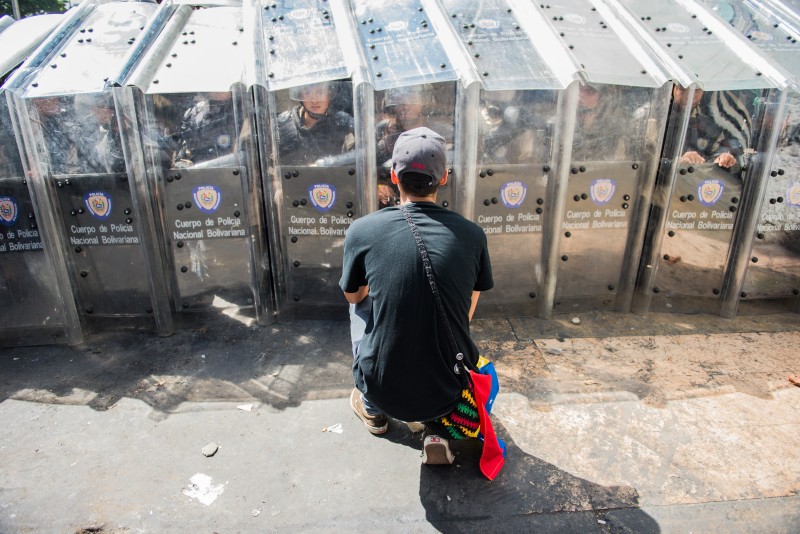
Student tries to persuade riot police in Caracas, Venezuela. Copyright Demotix 12 Feb 2014. Photo by Carlos Becerra.
Demonstrations began in late January, with students using peaceful, public rallies to advocate for better security in university residence halls. Protests started in the eastern state of Tachira but spread to multiple cities across the country in mid-February, after several student protesters were detained on dubious accusations of criminal activity.
Deadly clashes
On February 12 2014, riot police and armed security forces used violent force in an effort to take control of protests in Caracas, leaving three dead. Two anti-government protesters and one government supporter died of bullet wounds.
Venezuelan opposition leader Leopoldo Lopez surrendered himself to authorities on February 18 2014. He is accused of inciting violence during recent street protests, which have left at least four dead.
Lopez has denied the charges. Before turning himself in, he said ,”I present myself to an unjust judiciary. They want to jail Venezuelans who want peaceful, democratic change.”
Earlier this year, Lopez put his support behind anti-government protests initiated by students. Soon after Lopez gave himself up, Venezuelan president Nicolas Maduro called for an end to the violence.
Opposition joins protests
Students received the support of citizens and opposition leaders like Harvard-educated Lopez, who also demanded relief from food shortages and solutions to other socio-economic problems affecting the population. As inflation rates have skyrocketed in recent months, violent crime has increased dramatically and many Venezuelans have been unable to meet their basic needs.
Media gag
The situation is receiving limited coverage by international media, in part to pressure from the Venezuelan government — media attempting to cover the protests have been threatened with fines, under a law that “prohibits the dissemination of media containing hate speech and
violence.” Colombian cable television network NTN24 was taken off the air on February 12, allegedly due to its coverage of protests.
Users have reported that multiple independent and pro-opposition blogs and news sites have been inaccessible on CANTV, Venezuela’s state-owned ISP that has a near monopoly over the national telecom market.
Activists and media workers using social media to report on protestsare also facing big hurdles. As of February 13, Twitter users were unable to send or receive photos in the country, allegedly due to state efforts to block Twitter’s multimedia servers.
Calls for responsible social media
Netizens are now at the forefront of information dissemination. Eye-witness accounts, photos, videos, and extreme opinions and fears expressed by both the opposition groups and pro-government groups are flooding the Internet through hashtags, tweets, and blogs.
Netizen groups have been debunking rumours or false news on social media and are calling for responsible sourcing by netizens.
Global support
Venezuelans living abroad have organised demonstrations to support ongoing protests in their home country. Images are published on social networks with the hashtags #iamyourvoicevenezuela #SOSVenezuela #PrayForVenezuela.
Global Voices Coverage
Mar 19 Venezuela's New Security Agency: Watching the Web With No Judicial Oversight
Mar 17 #SOSVenezuela: Hashtag of Reality
Mar 08 Video Exposes Police Abuse in Venezuela (or is it Colombia?)
Mar 07 What do Government Supporters Have to Say About Protests in Venezuela?
Mar 06 Venezuela Cuts Ties with Panama
Mar 06 Unofficial Soundtrack to Venezuela's Protests: La Vida Boheme
Mar 05 The Peruvian Left Weighs in on Venezuelan Protests
Mar 04 Venezuelan TV Station Didn't Air Oscars for the First Time in 39 Years
Mar 04 The Peruvian Left Weighs in on Venezuelan Protests
Mar 04 Singer Rubén Blades and President Maduro Exchange Words Over Venezuela
Feb 28 Uruguayan President José Mujica Rejects “Foreign Interference” in Venezuela
Feb 25 PHOTOS: Venezuelan Women March for Peace in Caracas
Feb 25 List of Deceased in Venezuela Protests Available in 5 Languages
Feb 24 The Venezuela I'll Always Remember
Feb 24 Brief Summary of the Situation in Venezuela for the Curious or Poorly Informed
Feb 23 Walkie-Talkie App Zello Blocked in Venezuela
Feb 23 Venezuelans in Mexico to Protesters: “You Are Not Alone”
Feb 22 Venezuela: The Internet Goes Dark in Táchira
Feb 21 GV Face: Venezuela Protests
Feb 21 Venezuela Protests: ‘Dear International Media: Step it Up!’
Feb 20 Violence Escalates as Protests Continue in Venezuela
Feb 20 Venezuelan Beauty Queen Dies from Gunshot Wound Received During Protests
Feb 19 PHOTOS: Venezuelans Abroad Show Support for Protests
Feb 19 Rumours and ‘Fake’ Photos Prompt Calls for Responsible Social Media in Venezuela
Feb 18 Venezuelan Opposition Leader Leopoldo López Turns Himself in Amid Mass Demonstration
Feb 18 Venezuela: Police Seize Protester Mobile Phones
Feb 18 Collecting Data About Possible Web Censorship in Venezuela
Feb 16 PHOTOS: Protests Continue Across Venezuela
Feb 15 Reflections Amid Protests and Chaos in Venezuela
Feb 15 Venezuela: Twitter Photos Blocked as Protests Continue
Feb 14 Venezuela: Protests Leave Three Dead as Threats to Media Escalate
Feb 12 Venezuela: Authorities Threaten to Fine Media Outlets for Protest Coverage
Resources
BBC Mundo (Spanish)
How a first-time film-maker alerted the world to Venezuela's student protests (The Guardian)
Venezuelans divided on the streets and on Twitter (Al Jazeera Blog)
Twitter
Tweets about “#venezuela”
